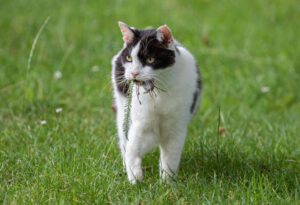My Cat Caught a Mouse or a Bird – What Do I Do?
As a cat owner, you may have experienced the unsettling moment when your feline companion presents you with a “gift” in the form of a captured mouse or bird. This natural hunting behavior can be distressing, especially for those who are concerned about the well-being of wildlife and the potential risks to their cat’s health. In this article, we will discuss the reasons behind this behavior, the steps you should take when your cat catches a mouse or bird, and how to discourage hunting in the future.

Understanding Your Cat’s Hunting Instincts
Cats are natural predators, and their hunting instincts are deeply ingrained, even in domesticated felines. These instincts are not driven solely by hunger; they are also stimulated by the thrill of the chase and the need to practice their hunting skills. This is why even well-fed cats may still hunt and capture prey.
When your cat catches a mouse or bird, they may present it to you as a “gift” because they consider you a part of their social group. In the wild, mother cats will teach their kittens how to hunt by bringing them captured prey. Your cat may be attempting to share their successful hunt with you, as they would with their family members in a natural setting.
What to Do
Listed below are tips on what to do when your cat catches a mouse or bird:
Remain Calm
It is essential to remain calm and composed when dealing with this situation. Your cat is merely following their instincts and may not understand why their actions are causing you distress.
Assess the Situation
Determine whether the captured prey is still alive or deceased. If the animal is still alive, it may require immediate attention to minimize suffering and determine if it can be saved.
Protect Yourself
Wear gloves or use a towel to handle the captured animal, as they may carry diseases or parasites that can be transmitted to humans.
Isolate Your Cat
To prevent further harm to the prey or injury to your cat, isolate your cat in a separate room while you deal with the situation.
Handle the Prey
If the animal is deceased, dispose of it safely and hygienically, preferably by placing it in a sealed plastic bag before putting it in an outdoor trash receptacle. If the animal is still alive and appears to be injured, consider contacting a local wildlife rehabilitation center or veterinarian for advice on the next steps. In some cases, they may be able to treat the animal and release it back into the wild.
Check Your Cat for Injuries
Ensure that your cat has not sustained any injuries during the hunt, such as scratches or bites. If you find any injuries, consult your veterinarian for advice on treatment and prevention of infection.
Monitor Your Cat’s Health
After a successful hunt, it is crucial to monitor your cat’s health, as consuming wild prey can expose them to parasites or diseases. If your cat shows any signs of illness, such as vomiting, diarrhea, or lethargy, contact your veterinarian immediately.
How to Discourage Hunting Behavior
While it may be challenging to eliminate your cat’s hunting instincts entirely, there are several steps you can take to reduce the likelihood of them catching mice or birds:
Keep Your Cat Indoors
One of the most effective ways to prevent hunting is to keep your cat indoors, particularly during dawn and dusk when prey animals are most active. Indoor cats also have a lower risk of injury, illness, and encounters with predators.
Provide Environmental Enrichment
Keeping your cat entertained and mentally stimulated can help to reduce their desire to hunt. Provide a variety of toys, scratching posts, and climbing structures to keep your cat engaged and satisfied. Interactive toys, such as puzzle feeders and laser pointers, can help to mimic the chase and satisfy your cat’s hunting instincts in a controlled environment.
Engage in Regular Playtime
Schedule daily play sessions with your cat to help fulfill their need for physical activity and mental stimulation. Use toys that mimic the movements of prey animals, such as feather wands or toy mice, to provide an outlet for their hunting instincts without harming wildlife.
Consider a Patio or Enclosed Outdoor Space
If you want to provide your cat with safe outdoor access, consider building a patio or an enclosed outdoor space that allows them to enjoy the outdoors without the ability to hunt wildlife.
Implement Deterrents for Wildlife
Utilize wildlife deterrents in your yard, such as bird feeders with protective cages or ultrasonic repellents, to help discourage birds and small mammals from entering areas where your cat has access.
Use a Breakaway Collar With a Bell
Outfitting your cat with a breakaway collar that features a bell can help to alert prey animals to their presence, reducing the likelihood of a successful hunt. Keep in mind that some cats may learn to stalk silently despite the bell, so this method may not be entirely foolproof.
Spay or Neuter Your Cat
Spaying or neutering your cat can help to reduce certain behaviors, including roaming and hunting. In addition to the potential reduction in hunting behavior, spaying or neutering your cat has numerous health benefits and helps to control the pet population.
Monitor and Manage Your Cat’s Weight
Ensure that your cat is receiving an appropriate diet and maintaining a healthy weight. Overweight cats may be less inclined to engage in hunting behavior due to decreased energy levels and mobility.
Follow the Tips Above if Your Cat Catches a Mouse or Bird
Cats are natural hunters, and their instincts to pursue prey are deeply ingrained. When your cat catches a mouse or bird, it is essential to remain calm, assess the situation, and take appropriate action to ensure the well-being of both the prey and your cat. While it may be challenging to eliminate hunting behavior entirely, there are various strategies you can employ to reduce the likelihood of your cat catching wildlife

